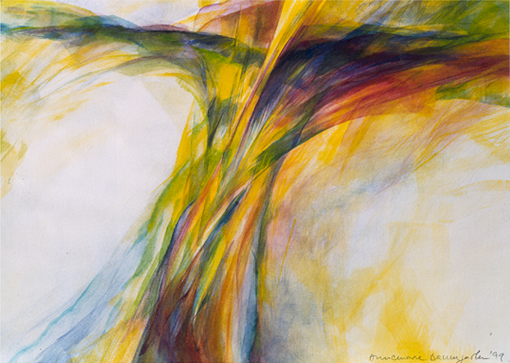
Feb 27, 2017 | Non categorizzato

Watercolour © A.M Baumgarten
Feb 27, 2017 | Non categorizzato, Word of
for ages 4-8 | for ages 9-14 | for ages 15-17 | MP3 Audio | Print
We can live like the first Christians and witness in our lives to God’s overwhelming love. If we, his followers, are truly reconciled among ourselves, we can speak convincingly of God’s reconciling love for the world. “Be reconciled to God” (2 Cor 5:20). All over the world, there are blood-soaked wars. They seem endless, and they embroil families, tribes and peoples. Twenty-year-old Gloria told this story: “We got news of a village that’d been burnt down. Lots of people lost everything. With my friends I collected some useful things: mattresses, clothes, food. We set out and after an eight hour journey we met all those people in such terrible need. We listened to them, dried their tears, hugged them and tried to comfort them. One family told us, ‘Our little girl was in the house they burnt down. It felt like we were dying with her. Now, through your love, we have the strength to forgive the men who did this!’” The Apostle Paul also experienced this kind of forgiveness, and it completely changed his life. He, the very one who was persecuting Christians,1 met God’s free-given love. It came in a completely unexpectedly way as he was travelling. God then sent him out in his name 2 as an ambassador of reconciliation. This is how Paul became a passionate and credible witness to the mystery of Jesus who died and rose again. He spoke of Jesus who had reconciled the world to himself so that everyone could know and experience a life of communion with him and one another.3 Through Paul the Gospel message reached and fascinated even pagans, those thought to be furthest from salvation: “Be reconciled to God!” he said. Despite our failings that discourage us or the false certainties that fool us into thinking we have no need, we too can meet God’s mercy. His love is so excessive! We can let it heal our hearts and in the end set us free to share this treasure with others. Like this we will give our contribution to God’s plan of peace for all humanity and the whole of creation. This plan overcomes the contradictions of history, as Chiara Lubich suggests in this passage: “On the cross, in the death of his Son, God gave us the highest proof of his love. Through Christ’s cross, he reconciled us to himself. This fundamental truth of our faith is fully relevant today. “It is the revelation all humankind awaits. Yes, God is close to all people with his love and he loves each person passionately. Our world needs to hear this proclamation, but we can proclaim God’s love if first we proclaim it, again and again, to ourselves — until we feel surrounded by this love, even when everything would make us think the opposite.… All our behaviour should make this truth credible. “Jesus said clearly that before bringing our offering to the altar we should be reconciled with a brother or sister if they have anything against us (see Mt 5:23-24) … So let’s love one another as he loved us, without being closed or prejudiced, but being open to welcome and appreciate the positive in our neighbour, ready to give our lives for one another. This is Jesus’ main command, the mark of Christians, valid today just as it was at the time of Christ’s first followers. Living this word means becoming reconcilers.” Living like this we will enrich our days with acts of friendship and reconciliation: in our own family and among families, in our own Church and among Churches, in every civil and religious community to which we belong. Letizia Magri
- See Acts 22:4 ff.
- See 2 Cor 5:
- See Eph 2:13 f
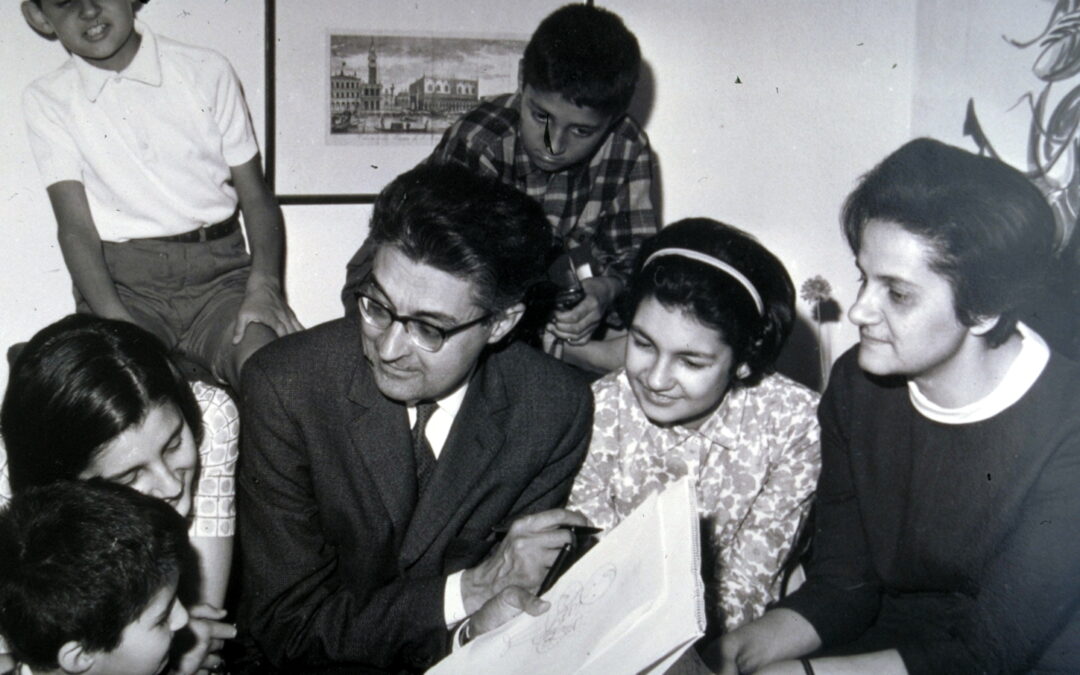
Feb 26, 2017 | Non categorizzato
 How important was it for you to meet Chiara Lubich, what impact did it have on you and your family, and what were the effects of your relationship with her and her spirituality? Danilo: “In the environment where Anna Maria and I were raised, traditional customs were of great importance. The family was present, but it was united more often due to social customs. Upon meeting Chiara we understood that being Christians entailed a choice, above all. That’s why we suffered a lot to free ourselves from the mentality of those times, and the attachment to our roles, circles, and professional titles. I had undertaken the career of an engineer, but to live the Gospel completely, we started to host the poor, and practice the communion of goods. All these things were a scandal, since they broke away from the customs of a bourgeois city. So my parents didn’t understand our decisions and were against them. I remember that once, I had gone to speak in a mountain town since I was also the diocesan president of the Catholic men. I was suffering and torn inside. Right after that I went to Church and found myself before a statue of Jesus Forsaken. I immediately and clearly understood that facing such painful moments is also part of our being Christians.”
How important was it for you to meet Chiara Lubich, what impact did it have on you and your family, and what were the effects of your relationship with her and her spirituality? Danilo: “In the environment where Anna Maria and I were raised, traditional customs were of great importance. The family was present, but it was united more often due to social customs. Upon meeting Chiara we understood that being Christians entailed a choice, above all. That’s why we suffered a lot to free ourselves from the mentality of those times, and the attachment to our roles, circles, and professional titles. I had undertaken the career of an engineer, but to live the Gospel completely, we started to host the poor, and practice the communion of goods. All these things were a scandal, since they broke away from the customs of a bourgeois city. So my parents didn’t understand our decisions and were against them. I remember that once, I had gone to speak in a mountain town since I was also the diocesan president of the Catholic men. I was suffering and torn inside. Right after that I went to Church and found myself before a statue of Jesus Forsaken. I immediately and clearly understood that facing such painful moments is also part of our being Christians.”
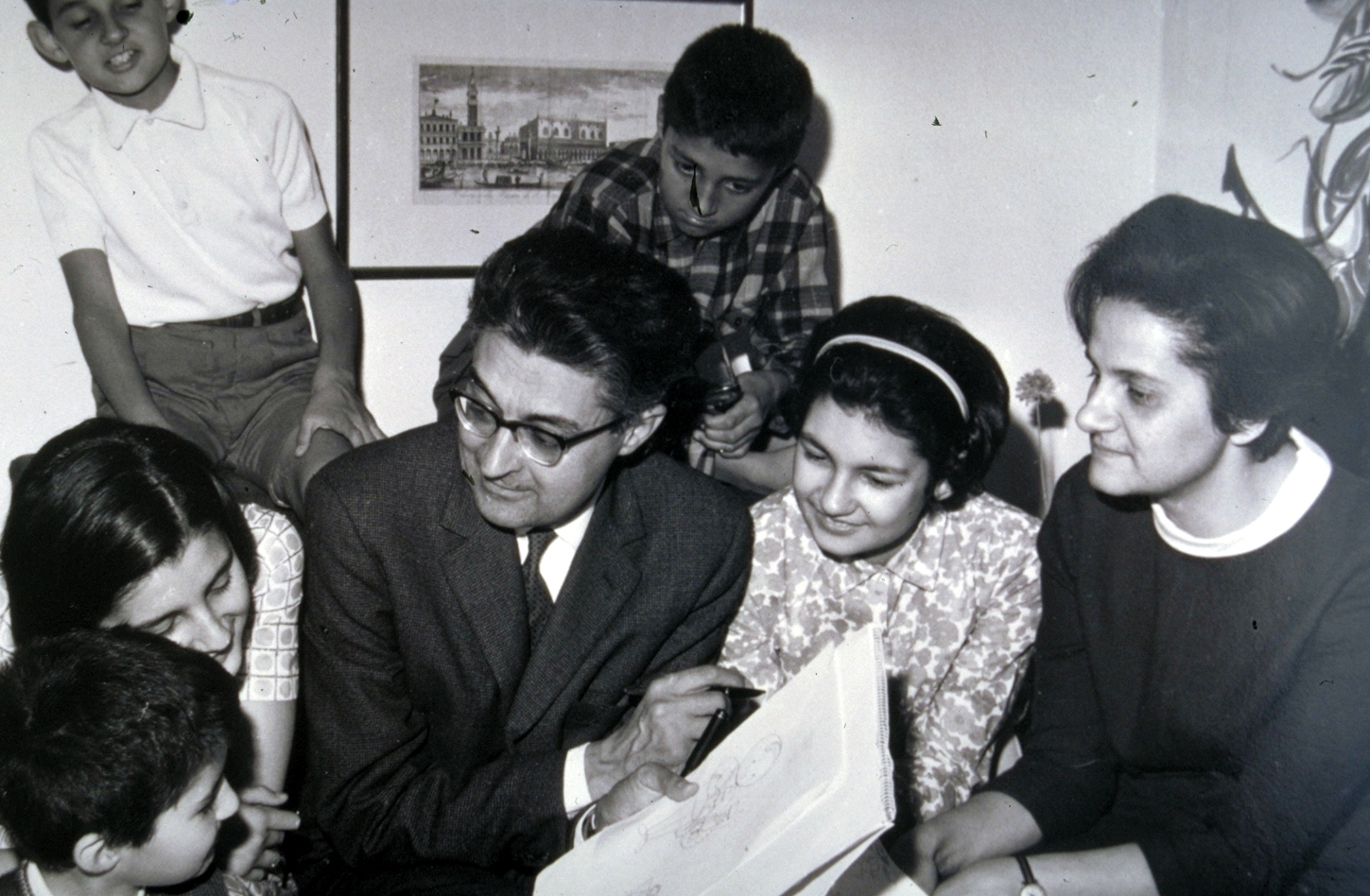
The Zanzucchi family
Giovanna Pieroni
![Interreligious friendships in England]()
Feb 25, 2017 | Non categorizzato
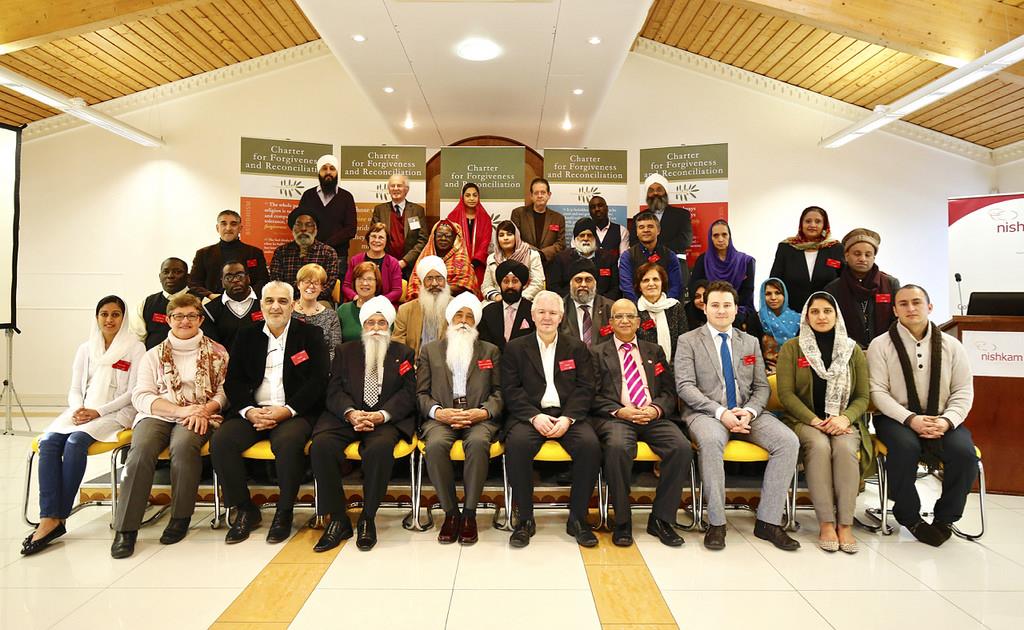 Birmingham is a multi-ethnic city of central England where the presence of different religions and cultures has become a breeding ground for dialogue. The city itself is a laboratory of interreligious relationships based on mutual respect and the discovery of each other’s values. Catholic Archbishop Bernard Longley, along with the council of religious leaders of other faiths in Birmingham, is directly involved in the interreligious field and more than once has expressed the desire that the Charism of Unity might bring a contribution in the Church and in ecumenical and interreligious dialogue. In October 2015, he made a house available to the Focolare in the diocese of Birmingham. Now, members from the community in Welwyn Garden City carry out many initiatives on a bi-monthly basis. They began with the Gen Verde international band’s “Start Now” project and continue carrying out many other initiatives.
Birmingham is a multi-ethnic city of central England where the presence of different religions and cultures has become a breeding ground for dialogue. The city itself is a laboratory of interreligious relationships based on mutual respect and the discovery of each other’s values. Catholic Archbishop Bernard Longley, along with the council of religious leaders of other faiths in Birmingham, is directly involved in the interreligious field and more than once has expressed the desire that the Charism of Unity might bring a contribution in the Church and in ecumenical and interreligious dialogue. In October 2015, he made a house available to the Focolare in the diocese of Birmingham. Now, members from the community in Welwyn Garden City carry out many initiatives on a bi-monthly basis. They began with the Gen Verde international band’s “Start Now” project and continue carrying out many other initiatives. 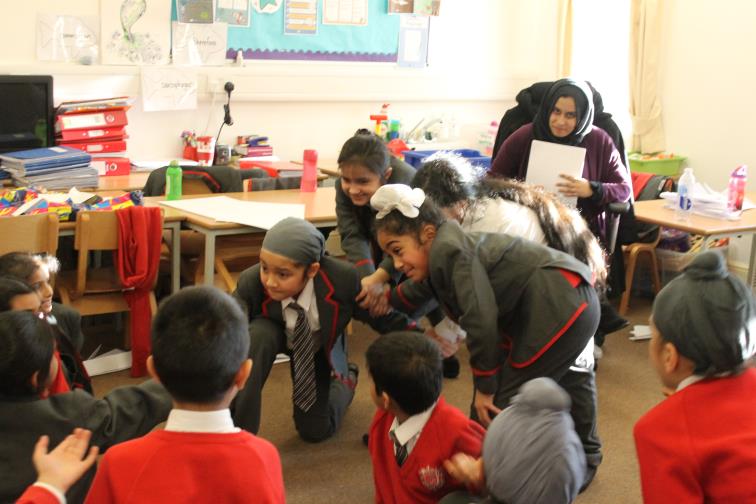 Last January, a Volunteer from the Focolare Movement, who is an expert in the field of education, ran the first of 4 workshops in a Sikh school for 70 children between the ages of 7 and 8. The theme was values. “The Sikhs feel a strong bond with us,” she recounts. “They say that like you, we try to model a society based on the fusion between the human and the divine. They find a harmony in the Movement that helps them to deepen their values and put them into practice.” The project is the culmination of a long friendship. For years the Sikh community guided by Bhi Sahib Bhai Mohinder Singh has been constantly linked to the Focolare community in Birmingham. The friendship and mutual esteem is deepening. “Bhai Sahib Ji often tells us that Chiara Lubich is his inspiration,” a Focolare member writes. “He keeps a photo of her on his desk.”
Last January, a Volunteer from the Focolare Movement, who is an expert in the field of education, ran the first of 4 workshops in a Sikh school for 70 children between the ages of 7 and 8. The theme was values. “The Sikhs feel a strong bond with us,” she recounts. “They say that like you, we try to model a society based on the fusion between the human and the divine. They find a harmony in the Movement that helps them to deepen their values and put them into practice.” The project is the culmination of a long friendship. For years the Sikh community guided by Bhi Sahib Bhai Mohinder Singh has been constantly linked to the Focolare community in Birmingham. The friendship and mutual esteem is deepening. “Bhai Sahib Ji often tells us that Chiara Lubich is his inspiration,” a Focolare member writes. “He keeps a photo of her on his desk.” 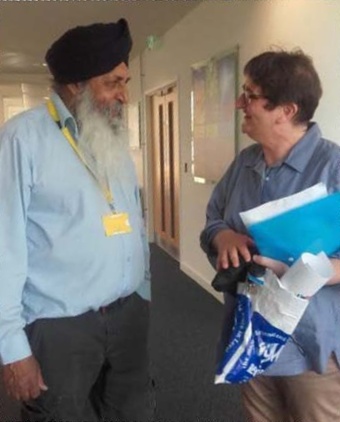 Sikhs and members of the Focolare recently took part together in an interreligious conference. Bhai Sahib Ji presented a project for promoting forgiveness and reconciliation. The event was an opportunity to strengthen friendships between members of different religions and beliefs, who now continue to stay in contact.
Sikhs and members of the Focolare recently took part together in an interreligious conference. Bhai Sahib Ji presented a project for promoting forgiveness and reconciliation. The event was an opportunity to strengthen friendships between members of different religions and beliefs, who now continue to stay in contact. 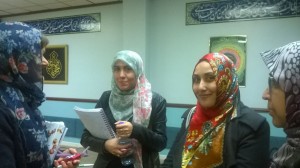 Still in January, Dr Mohammad Shomali, Founding Director of the International Institute for Islamic Studies in Qum, invited several men and women focolarini to speak to a group of thirty Muslims at a mosque in on one of the quarters of Birmingham. His desire was to “put together the people he esteems and loves the most: his community and the Focolare.” The Church’s dialogue with Islam was discussed, and the Spirituality of Unity was proposed, along with the presentation of a few experiences of living the Word. Many Muslims remained enthusiastic and want to stay in contact with the Focolare. “They invited us back on Sunday for the ‘Visit My Mosque’ event,” they report. They conclude: “Over the past weeks in which we have made many new friends of other faiths, we remembered a letter that Chiara wrote on November 23,1980 where she said: ‘…and if there is a mosque, or a synagogue, or some other non-Christian house of worship – know that that is where you belong…’ It’s a project about building the universal family, also among the faithful of other religions.”
Still in January, Dr Mohammad Shomali, Founding Director of the International Institute for Islamic Studies in Qum, invited several men and women focolarini to speak to a group of thirty Muslims at a mosque in on one of the quarters of Birmingham. His desire was to “put together the people he esteems and loves the most: his community and the Focolare.” The Church’s dialogue with Islam was discussed, and the Spirituality of Unity was proposed, along with the presentation of a few experiences of living the Word. Many Muslims remained enthusiastic and want to stay in contact with the Focolare. “They invited us back on Sunday for the ‘Visit My Mosque’ event,” they report. They conclude: “Over the past weeks in which we have made many new friends of other faiths, we remembered a letter that Chiara wrote on November 23,1980 where she said: ‘…and if there is a mosque, or a synagogue, or some other non-Christian house of worship – know that that is where you belong…’ It’s a project about building the universal family, also among the faithful of other religions.”
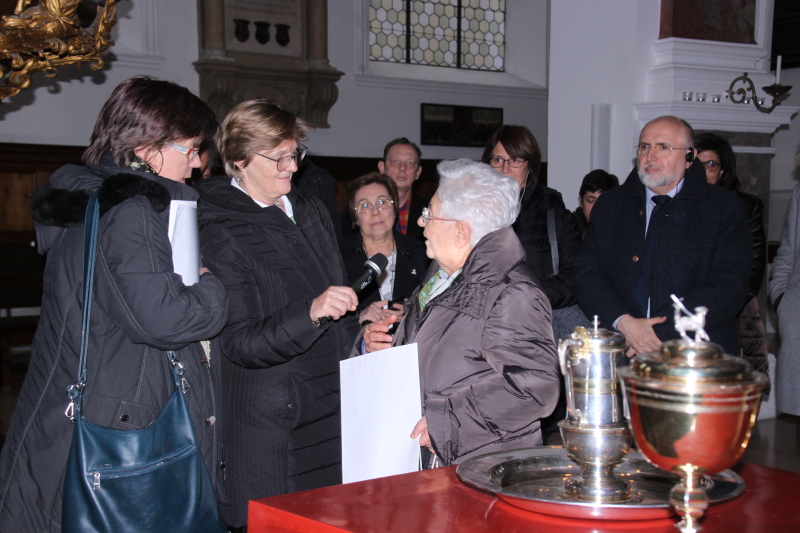
Feb 22, 2017 | Non categorizzato
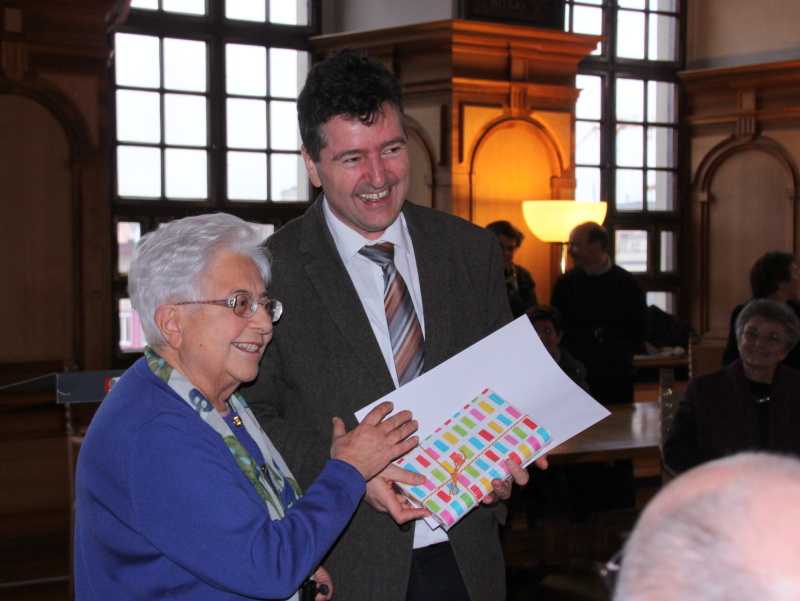
Maria Voce with the Vice-Mayor of Augsburg Dr Stefan Kiefer. Photo Maria Kny – © CSC Audiovisivi

Photo Maria Kny – © CSC Audiovisivi
Feb 21, 2017 | Non categorizzato
The convention is being promoted by Providence University in collaboration with Dharma Drum Arts, the Sophia University Institute of Italy, Fu Jen Catholic University of Taiwan and other academic institutions in Taiwan and abroad. Among the participants are, the Arts and Sciences Professor of Dharma Drum, and likewise professors of Sophia in Italy, professors and scholars of various universities of the USA, monks and scholars from Thailand, Japan, South Korea and other religious groups. Since 2004, the Foclare Movement has been holding Buddhist-Christian symposiums every two years in various cities. The Symposiums amongst Buddhists (Mahayana and Theravada) and Christians have always been important steps in strengthening mutual trust on the basis of respect for the others, and in preparing to work together on this meeting in Taiwan.





 How important was it for you to meet Chiara Lubich, what impact did it have on you and your family, and what were the effects of your relationship with her and her spirituality? Danilo: “In the environment where Anna Maria and I were raised, traditional customs were of great importance. The family was present, but it was united more often due to social customs. Upon meeting Chiara we understood that being Christians entailed a choice, above all. That’s why we suffered a lot to free ourselves from the mentality of those times, and the attachment to our roles, circles, and professional titles. I had undertaken the career of an engineer, but to live the Gospel completely, we started to host the poor, and practice the communion of goods. All these things were a scandal, since they broke away from the customs of a bourgeois city. So my parents didn’t understand our decisions and were against them. I remember that once, I had gone to speak in a mountain town since I was also the diocesan president of the Catholic men. I was suffering and torn inside. Right after that I went to Church and found myself before a statue of Jesus Forsaken. I immediately and clearly understood that facing such painful moments is also part of our being Christians.”
How important was it for you to meet Chiara Lubich, what impact did it have on you and your family, and what were the effects of your relationship with her and her spirituality? Danilo: “In the environment where Anna Maria and I were raised, traditional customs were of great importance. The family was present, but it was united more often due to social customs. Upon meeting Chiara we understood that being Christians entailed a choice, above all. That’s why we suffered a lot to free ourselves from the mentality of those times, and the attachment to our roles, circles, and professional titles. I had undertaken the career of an engineer, but to live the Gospel completely, we started to host the poor, and practice the communion of goods. All these things were a scandal, since they broke away from the customs of a bourgeois city. So my parents didn’t understand our decisions and were against them. I remember that once, I had gone to speak in a mountain town since I was also the diocesan president of the Catholic men. I was suffering and torn inside. Right after that I went to Church and found myself before a statue of Jesus Forsaken. I immediately and clearly understood that facing such painful moments is also part of our being Christians.”  Birmingham is a multi-ethnic city of central England where the presence of different religions and cultures has become a breeding ground for dialogue. The city itself is a laboratory of interreligious relationships based on mutual respect and the discovery of each other’s values. Catholic Archbishop Bernard Longley, along with the council of religious leaders of other faiths in Birmingham, is directly involved in the interreligious field and more than once has expressed the desire that the Charism of Unity might bring a contribution in the Church and in ecumenical and interreligious dialogue. In October 2015, he made a house available to the Focolare in the diocese of Birmingham. Now, members from the community in Welwyn Garden City carry out many initiatives on a bi-monthly basis. They began with the Gen Verde international band’s “Start Now” project and continue carrying out many other initiatives.
Birmingham is a multi-ethnic city of central England where the presence of different religions and cultures has become a breeding ground for dialogue. The city itself is a laboratory of interreligious relationships based on mutual respect and the discovery of each other’s values. Catholic Archbishop Bernard Longley, along with the council of religious leaders of other faiths in Birmingham, is directly involved in the interreligious field and more than once has expressed the desire that the Charism of Unity might bring a contribution in the Church and in ecumenical and interreligious dialogue. In October 2015, he made a house available to the Focolare in the diocese of Birmingham. Now, members from the community in Welwyn Garden City carry out many initiatives on a bi-monthly basis. They began with the Gen Verde international band’s “Start Now” project and continue carrying out many other initiatives.  Last January, a Volunteer from the Focolare Movement, who is an expert in the field of education, ran the first of 4 workshops in a Sikh school for 70 children between the ages of 7 and 8. The theme was values. “The Sikhs feel a strong bond with us,” she recounts. “They say that like you, we try to model a society based on the fusion between the human and the divine. They find a harmony in the Movement that helps them to deepen their values and put them into practice.” The project is the culmination of a long friendship. For years the Sikh community guided by Bhi Sahib Bhai Mohinder Singh has been constantly linked to the Focolare community in Birmingham. The friendship and mutual esteem is deepening. “Bhai Sahib Ji often tells us that Chiara Lubich is his inspiration,” a Focolare member writes. “He keeps a photo of her on his desk.”
Last January, a Volunteer from the Focolare Movement, who is an expert in the field of education, ran the first of 4 workshops in a Sikh school for 70 children between the ages of 7 and 8. The theme was values. “The Sikhs feel a strong bond with us,” she recounts. “They say that like you, we try to model a society based on the fusion between the human and the divine. They find a harmony in the Movement that helps them to deepen their values and put them into practice.” The project is the culmination of a long friendship. For years the Sikh community guided by Bhi Sahib Bhai Mohinder Singh has been constantly linked to the Focolare community in Birmingham. The friendship and mutual esteem is deepening. “Bhai Sahib Ji often tells us that Chiara Lubich is his inspiration,” a Focolare member writes. “He keeps a photo of her on his desk.”  Sikhs and members of the Focolare recently took part together in an interreligious conference. Bhai Sahib Ji presented a project for promoting forgiveness and reconciliation. The event was an opportunity to strengthen friendships between members of different religions and beliefs, who now continue to stay in contact.
Sikhs and members of the Focolare recently took part together in an interreligious conference. Bhai Sahib Ji presented a project for promoting forgiveness and reconciliation. The event was an opportunity to strengthen friendships between members of different religions and beliefs, who now continue to stay in contact.  Still in January, Dr Mohammad Shomali, Founding Director of the International Institute for Islamic Studies in Qum, invited several men and women focolarini to speak to a group of thirty Muslims at a mosque in on one of the quarters of Birmingham. His desire was to “put together the people he esteems and loves the most: his community and the Focolare.” The Church’s dialogue with Islam was discussed, and the Spirituality of Unity was proposed, along with the presentation of a few experiences of living the Word. Many Muslims remained enthusiastic and want to stay in contact with the Focolare. “They invited us back on Sunday for the ‘Visit My Mosque’ event,” they report. They conclude: “Over the past weeks in which we have made many new friends of other faiths, we remembered a letter that Chiara wrote on November 23,1980 where she said: ‘…and if there is a mosque, or a synagogue, or some other non-Christian house of worship – know that that is where you belong…’ It’s a project about building the universal family, also among the faithful of other religions.”
Still in January, Dr Mohammad Shomali, Founding Director of the International Institute for Islamic Studies in Qum, invited several men and women focolarini to speak to a group of thirty Muslims at a mosque in on one of the quarters of Birmingham. His desire was to “put together the people he esteems and loves the most: his community and the Focolare.” The Church’s dialogue with Islam was discussed, and the Spirituality of Unity was proposed, along with the presentation of a few experiences of living the Word. Many Muslims remained enthusiastic and want to stay in contact with the Focolare. “They invited us back on Sunday for the ‘Visit My Mosque’ event,” they report. They conclude: “Over the past weeks in which we have made many new friends of other faiths, we remembered a letter that Chiara wrote on November 23,1980 where she said: ‘…and if there is a mosque, or a synagogue, or some other non-Christian house of worship – know that that is where you belong…’ It’s a project about building the universal family, also among the faithful of other religions.”